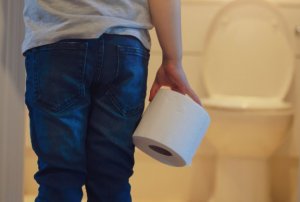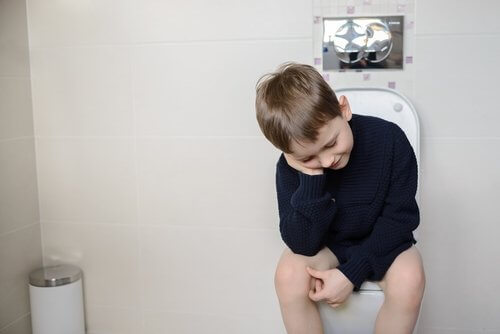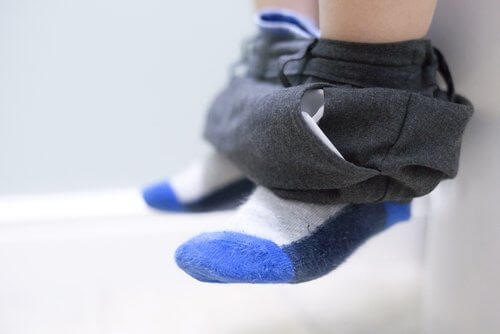When Children Are Afraid to Go Poop

When children are afraid to go poop, it almost always has to do with some intestinal problem related to the foods they eat. Lazy bowels, or atony, causes children to experience irritation or pain. Therefore, when they feel the need to go poop, they refuse to do so.
The case may also be that children find themselves in a strange place, different from what they’re used to. This situation can cause them to feel uneasy about taking care of their physiological needs.
This refusal gives way to constipation, meaning that their fecal matter becomes dry and hard. This makes pooping difficult and painful, thus contributing to a vicious cycle.
Where does the fear of going poop come from?
In general, this fear of going poop is associated with constipation and other related symptoms. However, it can also be the result of other causes. We’ll mention the most common factors below:
An excess of meat and egg-based foods
Eating too much protein leads to the hardening of fecal matter which, in turn, makes bowel movements more difficult.
A specialist should supervise a child’s nutrition during the first years of life in order to assure healthy growth and development. With adequate guidance and control, parents can avoid many digestive issues.
Laziness and sedentary lifestyle
A lack of exercise in children doesn’t only lead to difficulties when it comes to going to the bathroom. It can also cause cardiovascular problems. Therefore, it’s important for children to get involved in sports and other physical activities that are appropriate for their age.
Anxiety disorders related to mental exertion
These issues arise in school-aged children when they feel overwhelmed by excess mental exertion and are worried about schoolwork and academic activities.
Embarrassment
Many times, children are afraid to go poop because they’re embarrassed or uncomfortable. The possibility that someone may see them or that they’ll get dirty can cause them to be scared of going poop.

Insufficient water intake
When children don’t drink at least enough water to meet their hydration needs, their fecal matter becomes hard.
This causes pain and, on occasion, can even lead to bleeding after bowel movements. Out of fear that this may happen again, children avoid going poop at all costs.
When this type of phobia becomes more intense, it produces a great deal of discomfort. The fear doesn’t allow children’s bodies to carry out the natural and necessary act of getting rid of organic waste.
Not going poop can lead to serious issues like appendicitis, infection, intestinal fermentation, pain in the biliary tracts, and more.
What to do when children are afraid to go poop?
Experiencing fear is completely normal, especially in the first years of life. However, even though it’s something that’s very common, it shouldn’t be taken lightly. On the contrary, parents need to understand the seriousness of the issue and seek the help of a specialist.
Addressing the problem early on will, in great measure, help to eradicate the fear. Furthermore, it will prevent fecal retention from causing additional health problems.
Phobias and fears are people’s response to adverse situations like pain, discomfort, or something that they find disgusting. In the initial stages of life, these sorts of reactions are innate.
Children develop these fears without thinking about or comprehending the consequences of not taking care of their physiological needs.
As parents, we must be understanding of our little ones and provide a great deal of support in order for them to gradually overcome their obstacles. In no way should we ever force or obligate our children to face their fears. Rather than helping, this will only make things worse – further contributing to their phobia.
Conclusion
Talk openly with your child about his or her fear of going poop. This helps little ones gain the confidence they need to express their doubts and fears freely.
Open communication increases the possibilities of finding the right strategies for facing the fear. It allows children to be part of the solution and minimizes the exhaustion and burden that this issue represents for them.

Children need to sense the support from their loved ones and understand and participate in solving their fears. Little by little, these fears will fade as children comprehend that they have the ability to overcome any difficult situation.
These tips aren’t only helpful when it comes to dealing with children’s fear of going poop. They can also help children overcome any difficulty that comes their way.
When children are afraid to go poop, it almost always has to do with some intestinal problem related to the foods they eat. Lazy bowels, or atony, causes children to experience irritation or pain. Therefore, when they feel the need to go poop, they refuse to do so.
The case may also be that children find themselves in a strange place, different from what they’re used to. This situation can cause them to feel uneasy about taking care of their physiological needs.
This refusal gives way to constipation, meaning that their fecal matter becomes dry and hard. This makes pooping difficult and painful, thus contributing to a vicious cycle.
Where does the fear of going poop come from?
In general, this fear of going poop is associated with constipation and other related symptoms. However, it can also be the result of other causes. We’ll mention the most common factors below:
An excess of meat and egg-based foods
Eating too much protein leads to the hardening of fecal matter which, in turn, makes bowel movements more difficult.
A specialist should supervise a child’s nutrition during the first years of life in order to assure healthy growth and development. With adequate guidance and control, parents can avoid many digestive issues.
Laziness and sedentary lifestyle
A lack of exercise in children doesn’t only lead to difficulties when it comes to going to the bathroom. It can also cause cardiovascular problems. Therefore, it’s important for children to get involved in sports and other physical activities that are appropriate for their age.
Anxiety disorders related to mental exertion
These issues arise in school-aged children when they feel overwhelmed by excess mental exertion and are worried about schoolwork and academic activities.
Embarrassment
Many times, children are afraid to go poop because they’re embarrassed or uncomfortable. The possibility that someone may see them or that they’ll get dirty can cause them to be scared of going poop.

Insufficient water intake
When children don’t drink at least enough water to meet their hydration needs, their fecal matter becomes hard.
This causes pain and, on occasion, can even lead to bleeding after bowel movements. Out of fear that this may happen again, children avoid going poop at all costs.
When this type of phobia becomes more intense, it produces a great deal of discomfort. The fear doesn’t allow children’s bodies to carry out the natural and necessary act of getting rid of organic waste.
Not going poop can lead to serious issues like appendicitis, infection, intestinal fermentation, pain in the biliary tracts, and more.
What to do when children are afraid to go poop?
Experiencing fear is completely normal, especially in the first years of life. However, even though it’s something that’s very common, it shouldn’t be taken lightly. On the contrary, parents need to understand the seriousness of the issue and seek the help of a specialist.
Addressing the problem early on will, in great measure, help to eradicate the fear. Furthermore, it will prevent fecal retention from causing additional health problems.
Phobias and fears are people’s response to adverse situations like pain, discomfort, or something that they find disgusting. In the initial stages of life, these sorts of reactions are innate.
Children develop these fears without thinking about or comprehending the consequences of not taking care of their physiological needs.
As parents, we must be understanding of our little ones and provide a great deal of support in order for them to gradually overcome their obstacles. In no way should we ever force or obligate our children to face their fears. Rather than helping, this will only make things worse – further contributing to their phobia.
Conclusion
Talk openly with your child about his or her fear of going poop. This helps little ones gain the confidence they need to express their doubts and fears freely.
Open communication increases the possibilities of finding the right strategies for facing the fear. It allows children to be part of the solution and minimizes the exhaustion and burden that this issue represents for them.

Children need to sense the support from their loved ones and understand and participate in solving their fears. Little by little, these fears will fade as children comprehend that they have the ability to overcome any difficult situation.
These tips aren’t only helpful when it comes to dealing with children’s fear of going poop. They can also help children overcome any difficulty that comes their way.
All cited sources were thoroughly reviewed by our team to ensure their quality, reliability, currency, and validity. The bibliography of this article was considered reliable and of academic or scientific accuracy.
- Enciclopedia del Hogar. (1967). 11th ed. Barcelona – España: EDICIONES GARRIGA, S.A., Tomo I y II.
This text is provided for informational purposes only and does not replace consultation with a professional. If in doubt, consult your specialist.








